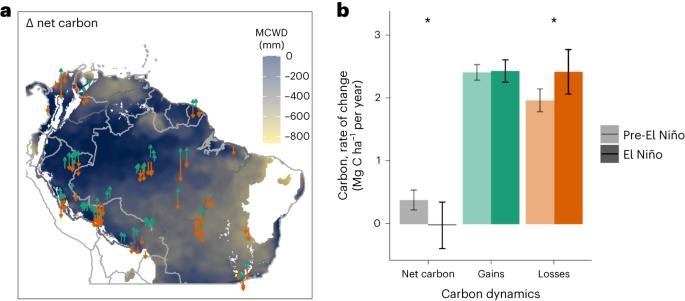2015-2016年厄尔尼诺现象对南美热带森林碳动力学的影响
IF 27.1
1区 地球科学
Q1 ENVIRONMENTAL SCIENCES
引用次数: 0
摘要
由 100 多名研究人员组成的网络对南美洲森林地块中的树木进行了长达 30 年的追踪,从而估算出创纪录的气温和干旱对碳动态的影响。在2015-2016年厄尔尼诺现象期间,这些森林的碳汇停止了,其中较干燥的森林碳损失最多。本文章由计算机程序翻译,如有差异,请以英文原文为准。

Impact of the 2015–2016 El Niño on the carbon dynamics of South American tropical forests
A network of more than 100 researchers tracked trees for up to 30 years in forest plots across South America, enabling estimation of the impacts of record temperatures and drought on carbon dynamics. The carbon sink in these forests ceased during the 2015–2016 El Niño, with drier forests losing the most carbon.
求助全文
通过发布文献求助,成功后即可免费获取论文全文。
去求助
来源期刊

Nature Climate Change
ENVIRONMENTAL SCIENCES-METEOROLOGY & ATMOSPHERIC SCIENCES
CiteScore
40.30
自引率
1.60%
发文量
267
审稿时长
4-8 weeks
期刊介绍:
Nature Climate Change is dedicated to addressing the scientific challenge of understanding Earth's changing climate and its societal implications. As a monthly journal, it publishes significant and cutting-edge research on the nature, causes, and impacts of global climate change, as well as its implications for the economy, policy, and the world at large.
The journal publishes original research spanning the natural and social sciences, synthesizing interdisciplinary research to provide a comprehensive understanding of climate change. It upholds the high standards set by all Nature-branded journals, ensuring top-tier original research through a fair and rigorous review process, broad readership access, high standards of copy editing and production, rapid publication, and independence from academic societies and other vested interests.
Nature Climate Change serves as a platform for discussion among experts, publishing opinion, analysis, and review articles. It also features Research Highlights to highlight important developments in the field and original reporting from renowned science journalists in the form of feature articles.
Topics covered in the journal include adaptation, atmospheric science, ecology, economics, energy, impacts and vulnerability, mitigation, oceanography, policy, sociology, and sustainability, among others.
 求助内容:
求助内容: 应助结果提醒方式:
应助结果提醒方式:


